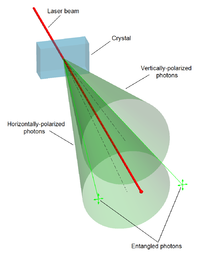
Photo from wikipedia
Entanglement measures quantify nonclassical correlations present in a quantum system, but can be extremely difficult to calculate, even more so, when information on its state is limited. Here, we consider… Click to show full abstract
Entanglement measures quantify nonclassical correlations present in a quantum system, but can be extremely difficult to calculate, even more so, when information on its state is limited. Here, we consider broad families of entanglement criteria that are based on variances of arbitrary operators and analytically derive the lower bounds these criteria provide for two relevant entanglement measures: the best separable approximation and the generalized robustness. This yields a practical method for quantifying entanglement in realistic experimental situations, in particular, when only few measurements of simple observables are available. As a concrete application of this method, we quantify bipartite and multipartite entanglement in spin-squeezed Bose-Einstein condensates of ∼500 atoms, by lower bounding the best separable approximation and the generalized robustness only from measurements of first and second moments of the collective spin operator.
Journal Title: Physical review letters
Year Published: 2021
Link to full text (if available)
Share on Social Media: Sign Up to like & get
recommendations!